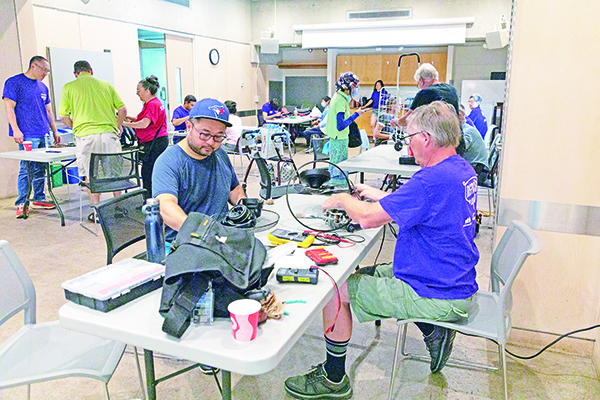General News » News
Circular Economy initiatives help keep useful items going
July 25, 2024 · 0 Comments

Recycle, Reduce, Reuse has been a green mantra for generations, but when it comes to Reuse, sometimes a helping hand is needed to make that happen.
York Region is stepping up with a series of initiatives to make Reuse an even more practical option in reducing waste by underscoring a fourth R – Repair.
The Region’s series of Repair Cafes have been a popular venue this summer for residents looking to get a little more mileage out of a wide variety of household and textile items. These cafes bring together handy experts who are able to work their special touch on everything from bike chains, to electronics, to jewellery and small appliances – and teach the art of repair themselves.
One such café hosted by the Region at Richmond Hill’s Central Library earlier this month was completely booked, as is an upcoming session August 10 at Newmarket Public Library.
The latest slate of Cafes soon to open for registration will take place September 21 at Vaughan Public Libraries, October 26 at Whitchurch-Stouffville Public Library, and November 23 back at the Aurora Public Library.
“The Repair Cafes are among our most popular Circular Economy Programs,” says Julie Hordowick, Program Manager of the Integrated Waste Management Strategy for the Region of York. “Lots of folks [have been] going through and getting items fixed, or at least learning a little bit more about their items while connecting with the fixers. The program is delivered by New Make It, which is a makerspace in Newmarket that manages the program and recruits volunteers to help with the fixing. We then host them at Libraries [who say] it is one of the most requested programs.”
The Region defines the “circular economy” as a concept that “eliminates waste and pollution and conserves resources. It’s a shift from a throw-away to a circular mindset to extend the lifestyle of goods, food and resources through better design and continuous reuse so nothing goes to waste.”
“In a circular economy, instead of industries, manufacturers and consumers taking resources, using them once and disposing of them, they will be kept in use,” says the Region. “Products will be designed to be more durable, reusable, repairable and recyclable, and businesses will look for ways to eliminate waste in their operations.
“Consumers will rethink the way they purchase, use and dispose of things – options for sharing, renting, repairing and repurposing items to prevent waste will become more common. This circular shift will lead to less impact on the environment, allowing the earth’s resources to recover and regenerate.”
In addition to the Repair Cafes, additional initiatives the Region is deploying to promote the Circular Economy concept are Curbside Giveaway Days and, in association with local libraries, “Lenderies” where residents are able to check out items, such as tools and appliances like power washers, they might need for a limited time and can return when they’re finished.
“The Circular Economy came out as a focus for our waste management programming as part of our SM4RT Living plan, which is our long-term Waste Management Master Plan and looking at how our community is expected to grow quite a bit,” says Hordowick. “We have a lot of very successful waste diversion programs and the opportunity we saw to improve the environmental and financial sustainability of our waste program wasn’t looking at ways we could reduce waste and knowing that change towards waste reduction and reuse means a behaviour change and a way of doing things for our residents, but also that there needs to be different opportunities for people within the community to access some of these services, to participate in the Circular Economy. We’re hearing (from residents) that more ‘lenderies’ would be great with more items and more opportunities to participate in those kinds of programs. We have a lot of demand for Repair Café programs, but one of the limiting factors is we don’t always have the volunteers with the skills to repair things – so, there are also opportunities to train more volunteers.
“This is a very new term for folks. It’s a lot more repairing, a lot more mending our clothing, a lot more sharing amongst family members and neighbours rather than owning our own. It’s bringing that back but understanding there is a modern twist on it. Swapping items might happen through a website or it might happen more digitally. It could be sharing platforms where you’re finding out things that way, YouTube’ing to learn more about repair skills we may have lost. When it comes [to the Circular Economy] we try to stress that you don’t need to do all the things. It’s important that people find the ways to participate in the circular economy in ways that fit their own lifestyle and their own ideas. You don’t need to mend every sock and make everything last as long as you can; it’s finding ways that are practical for you.”
For more information on the Region’s Circular Economy Initiatives, including upcoming opportunities, visit www.york.ca/newsroom/campaigns-projects/circular-economy.
By Brock Weir












